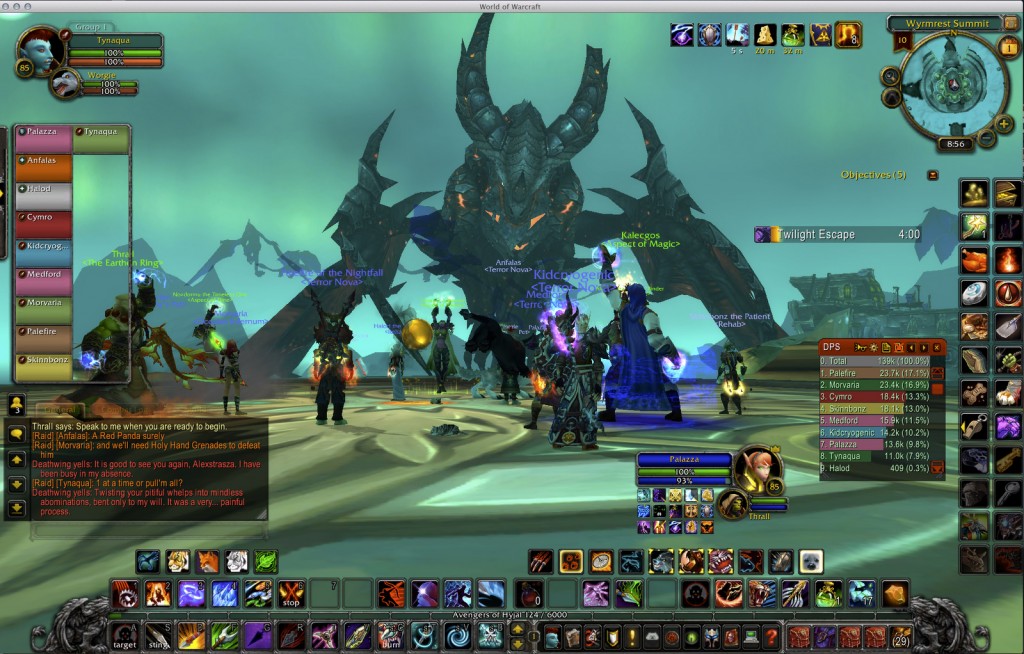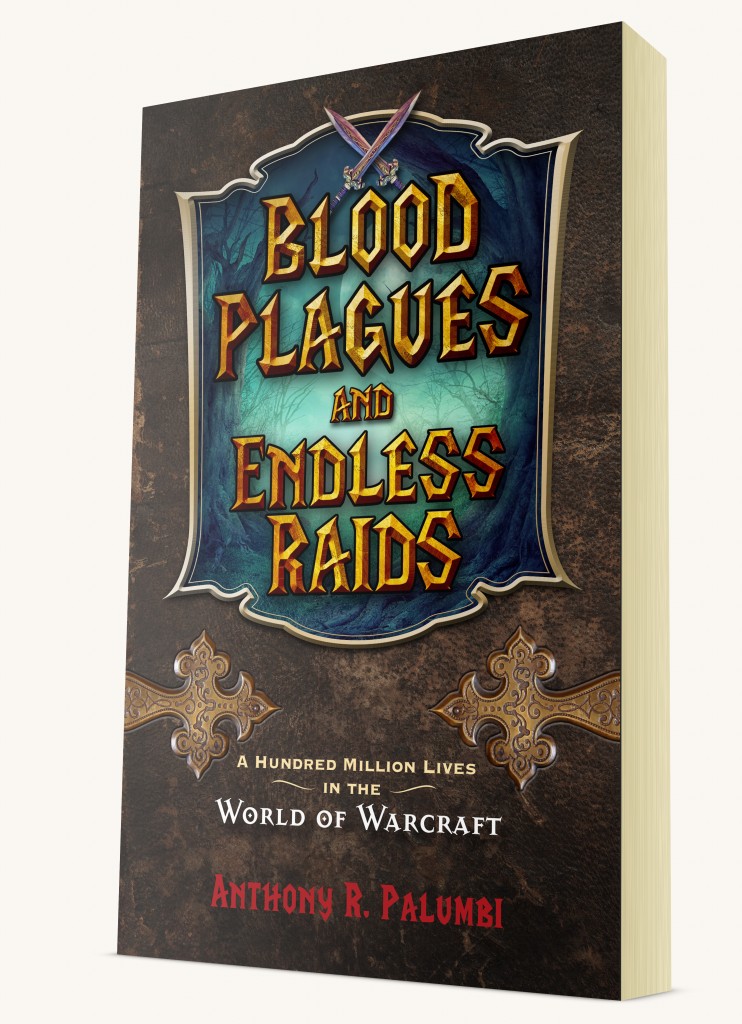 Since its inception 12 years ago, 100 million people have traded in their workaday selves in favor of becoming warriors, mages, assassins and healers in the massively multiplayer online role-playing game World of Warcraft. In Blood Plagues and Endless Raids: A Hundred Million Lives in the World of Warcraft (Chicago Review Press, April 1, 2017), author Anthony R. Palumbi gives readers an unprecedented inside look at the player community behind the game that changed our culture.
Since its inception 12 years ago, 100 million people have traded in their workaday selves in favor of becoming warriors, mages, assassins and healers in the massively multiplayer online role-playing game World of Warcraft. In Blood Plagues and Endless Raids: A Hundred Million Lives in the World of Warcraft (Chicago Review Press, April 1, 2017), author Anthony R. Palumbi gives readers an unprecedented inside look at the player community behind the game that changed our culture.
First off, for those of us who aren’t WoW players, can you give us a brief introduction to the game?
By nature I shy away from dramatic statements, but there’s really no hyperbole in calling WoW the biggest video game of all time. Any metric you want to choose—number of players, volume of sales, cultural impact—WoW is at or near the top of the list. It wasn’t the first of its kind, because other games like EverQuest first popularized the “massively multiplayer online role-playing game” genre, but it was the best and the most popular. Mechanically they all come down to creating an avatar, killing monsters and collecting loot from the monsters, but what really makes these games special is what the players do with them. Virtual worlds afford an incredible freedom to players, and their personal dramas are much more interesting than any of the battles they’re fighting in the game. Many have been playing WoW for more than a decade at this point, and it’s become a huge part of their lives alongside all these friends they’ve made and all the experiences they’ve shared.
Would you say this is a book for WoW insiders, or will nonplayers find interest and enjoyment in it as well?
Blood Plagues isn’t really the story of a video game; it’s the story of the people who played it. If you’ve ever been on the Internet or seen your children play video games, you already possess all the knowledge necessary to enjoy this book, because it’s really about how the Internet informs human interaction. A lot of people ask me about this balance, and I tell them it’s not as tough as it seems: when it comes to fine details of the game, the hardcore players already know the answers and the casual audience doesn’t care to know. Blood Plagues isn’t about killing dragons, it’s about how people build the kinds of social organizations that are capable of killing dragons. If you are a WoW fan, there’ll certainly be some fun nostalgia, but more than anything you’ll find a book that takes your passions seriously and tells stories you’ll immediately recognize.
Why did you think it was important to write a book about the cultural phenomenon of WoW?
WoW had the very good fortune to emerge right at the dawn of the modern Internet. Facebook was setting up its offices in Palo Alto just down the street from the dorm where I’d stay up half the night playing. The first iPhone was two years off. Everything that we now think of as the pillars of the Internet, from widespread social media to the mobile web, was just about to happen. For millions of people around the world, WoW was the very first time they’d ever lived a persistent online life. There were no protocols, no rules, no social norms, and so they had to teach themselves those things, and they carried over those lessons when the larger global Internet finally came together in the mid- to late-2000s. WoW taught an entire generation, including myself, how to live online. How to carry ourselves, how to maintain and market distinct personas depending on the medium. Even if you didn’t play WoW, you had friends and family who did. It was everywhere, and frankly I’d never seen a serious treatment of that reality. It was only confused stories about “game addiction” and derisive snorts about nerds in basements, when it was plain to see that wasn’t the case. My own personal experiences in the game put me in a unique position to tell these stories myself.
 You consider yourself part of the WoW community, so much of the narrative in your book is anecdotal. What other research did you conduct?
You consider yourself part of the WoW community, so much of the narrative in your book is anecdotal. What other research did you conduct?
I played WoW at a very high level when it first came out, enough so that I eventually found myself leading the world’s top Spanish-language guild (despite not speaking much Spanish at the time). During those years I moved through the game’s culture, learned a huge amount and thought about it a ton without ever expecting to write a book about it. When I did start work on Blood Plagues, I hadn’t played WoW in years, so there was a lot to catch up on. Getting my shaman back up to speed wasn’t nearly as difficult as poring through years’ worth of forums and news articles to learn the ins and outs of all the expansions I’d missed. Thankfully WoW’s entire life has occurred on the Internet and the community is huge, so I never lacked for sources. The real gold came from interviewing players past and present, hearing them talk about what they loved and hated, their struggles and triumphs. The community is so huge that no one person or perspective could ever capture it, so I cast a wide net and the players rewarded me.
Anything that surprised you in your research?
How much everyone loves talking about WoW. Anyone who played, even for a little bit, just lights up at the mention of the game and can talk for hours about her experiences. Older people who’ve never played games are keen to know just what the heck was going on in this game they’ve heard so much about. Everyone seems to know someone who played. I knew what I would find in the research, for the most part, but it was the enduring fellowship between players that really surprised me and helped convince me my approach was the right one. I’m most charmed by the close bonds formed between players, even if they’ve never met in real life. In fact, the distinction between online and real life relationships gets blurred very quickly, to the degree that I’m now convinced the distinction is mostly artificial. Shedding our born skins and wearing an identity we choose can be a really powerful, liberating thing, and I think games like WoW offer people some important intangible goods like fellowship, reinforcement and reward when those things are often missing from our daily lives.
Best story you came across in your research?
As a grizzled video game veteran with a dark sense of humor, I’m tickled by players going completely above and beyond the call of duty working for tiny advantages that probably don’t matter, just for the sake of being “hardcore.” Human folly, gleefully undertaken, is very funny to me. From a human perspective, I think my favorite story is of a young American woman who decided to play with some European friends from another game and ended up falling in love with a young man from England. They had this very sweet romance that might seem strange at first glimpse but was actually very conservative and old-fashioned in many ways. The whole idea of love requited but denied by circumstance, carried out over correspondence. Eventually she traveled to England to see him, and they shared their first kiss atop a medieval castle, and she met his family in a very small rural English town where nobody ever leaves, and though Aaron’s parents had never met an American before they said they felt as though Jessica were already family, because for almost a year they’d heard her voice every night coming out of his speakers as they’d chat while playing WoW. They already felt like they knew her, and they knew she made their son happy, and that was that. Jessica sharing that story really helped me appreciate what became a mantra for Blood Plagues the things that happen in video games aren’t real, but the people you meet are.
Finally, where do you think massively multiplayer online role-playing games (MMORPGs) like WoW go from here? What’s the next big thing that this community of players will latch onto?
 There won’t be another WoW. Toward the end of the book I discuss the evolution of the video game industry as a whole, and WoW ended up in the strange position of being both the ultimate MMORPG and the reason future games of the genre couldn’t succeed. WoW was so successful, financially and culturally, that other companies felt compelled to enter the MMORPG retail space. But these games are extremely difficult and expensive to make, and even a successful launch doesn’t guarantee a game’s ongoing health, so WoW’s competitors sunk billions of dollars into developing games that failed. It also didn’t help that WoW came along at the tail end of PC-based games as the focus of the industry. Now audiences are split between PC gamers, Xbox gamers, PlayStation gamers and mobile gamers. MMORPGs are very much relics of a mouse-and-keyboard world, and they’ll always have an audience, but as of 2017 that audience mostly plays WoW because they know it’ll always be around, always supported by Blizzard, and always well-populated with things to do and people with whom to do them. The time of MMORPGs is over, and I doubt we’ll never see a mass-culture phenomenon like WoW again. Which makes it all the more important to explore this topic, this period of time!
There won’t be another WoW. Toward the end of the book I discuss the evolution of the video game industry as a whole, and WoW ended up in the strange position of being both the ultimate MMORPG and the reason future games of the genre couldn’t succeed. WoW was so successful, financially and culturally, that other companies felt compelled to enter the MMORPG retail space. But these games are extremely difficult and expensive to make, and even a successful launch doesn’t guarantee a game’s ongoing health, so WoW’s competitors sunk billions of dollars into developing games that failed. It also didn’t help that WoW came along at the tail end of PC-based games as the focus of the industry. Now audiences are split between PC gamers, Xbox gamers, PlayStation gamers and mobile gamers. MMORPGs are very much relics of a mouse-and-keyboard world, and they’ll always have an audience, but as of 2017 that audience mostly plays WoW because they know it’ll always be around, always supported by Blizzard, and always well-populated with things to do and people with whom to do them. The time of MMORPGs is over, and I doubt we’ll never see a mass-culture phenomenon like WoW again. Which makes it all the more important to explore this topic, this period of time!
Blood Plagues and Endless Raids: A Hundred Million Lives in the World of Warcraft by Anthony R. Palumbi, officially publishes April 1, 2017. It is available wherever books and e-books are sold.
[Get it now $16] [Request a review copy]
No Comments
No comments yet.